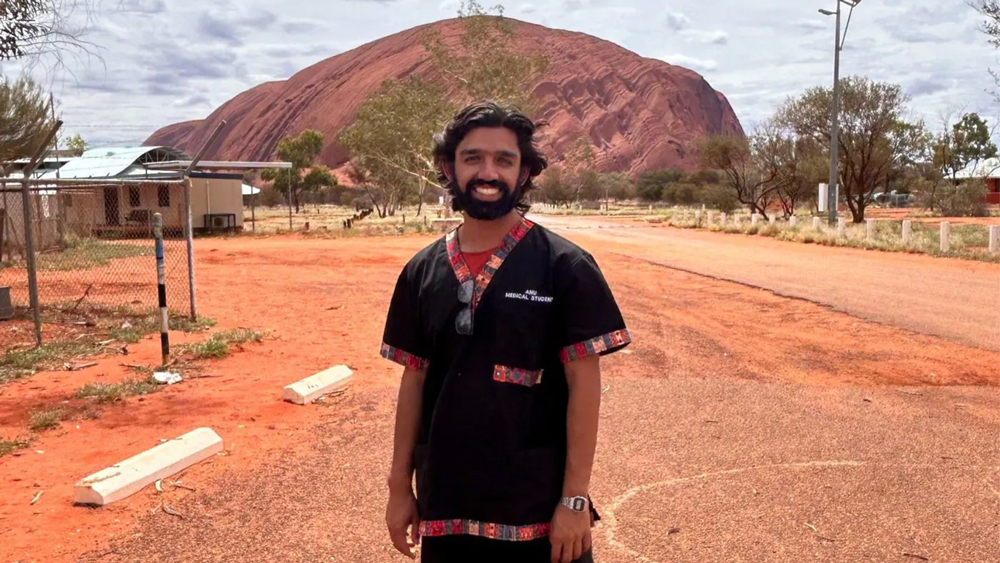Heart-to-hearts in the Red Centre

An Aboriginal woman from the Northern Territory and a first-generation Indian-Australian Sydneysider walk into a bar. It’s an opener with a punchline yet to be written.
My name is Atul, and I am a final-year medical student at ANU. For most of last year I was considering Anglicising my name.
During the summer I found myself in the town of Mutitjulu as part of my clinical elective. The Aboriginal community of roughly 500 people is a 10-minute walk to Uluru and closed to the public. It’s a short drive but a world away from Yulara — a resort town home almost exclusively to tourists and those servicing them.
Mutitjulu is rich in art and Central Desert languages and sits within a stunning landscape. However, it is also one of Australia’s poorest communities, with housing, plumbing, food and healthcare insecurities.
I was not confronted by Mutitjulu’s poverty. Growing up, stark disparities became normalised during many family trips to India. The slums next to megahotels for the wealthy tourists.
The stray, sometimes hostile dogs roaming the streets sniffing at trash.
But it was confronting to have this feeling in Australia.
Instead of the high walls tipped with broken glass separating the hotels and those less fortunate, the barrier was one of the world’s biggest and most culturally significant landmarks.
Instead of peering into the separate worlds in a Delhi strip, I was working and holidaying in the contrasting worlds of Mutitjulu and Yulara.
My name and Indian heritage didn’t make me an outsider compared with my experiences during a previous rural health placement.
“What should have been a warning sign instead gave me an odd sense of empowerment. My skin colour was… an advantage?”
In 2022, I was transported from the national capital to the New South Wales south coast. While the experience was extremely rewarding, I felt culturally isolated because of my heritage and Aussie accent.
Almost every other brown guy seemed to be either working at the petrol station or flown in as a GP to fill gaps in the rural health system under the Australian Government’s moratorium, which requires overseas-trained doctors to work in a ‘priority area’ for at least a decade. Both groups shared candid monologues about their struggles, echoing my father’s journey in the late 1980s.
Navigating a rural medical career felt like trespassing on the set of TV shows like Home and Away, while being wedged between country doctor dynasties and migrant physicians. I couldn’t see someone like me, which contrasted with my Sydney upbringing where I saw multigenerational academic success rooted in ethnic migrant struggles.
The increasing disempowerment tied to my name took a toll.
One day while ranting to my dad, he asked “would it help if you consider changing your name?”
It was a moment of humility, rare for a father let alone a migrant one. He himself changed his name and was part of the generation that did so to suit their workplace cultures. This included my family GP. To Anglicise my name did not feel like a foreign concept. Maybe it would make these problems go away?
I was actively considering it before arriving in Alice Springs, an outback town harbouring a complex combination of ancient Aboriginal culture and growing youth injustice due to cumulative intergenerational disadvantages and systemic abuse.
On the way from the airport a white guy said that “because you’re brown, you’re not going to get punched in the face at night”. What should have been a warning sign instead gave me an odd sense of empowerment. My skin colour was… an advantage?
Aboriginal patients in Mutitjulu instantly liked me or warmed to me quicker than my Caucasian colleagues, while some even mistook me as Aboriginal. Here, my skin colour wasn’t tied to metropolitan CALD, or ‘culturally and linguistically diverse’, tick boxes or stereotypes. I could walk anywhere on this red dirt and I wasn’t in whitefella country.
Coming from the Sydney selective/private school bubble, a multicultural background and studying medicine, some might say I’m a dime a dozen. So, why couldn’t I see that representation in both non-metropolitan experiences or, when I did, see it only in mandatory junior doctor rotations?
Were we influenced by our migrant parents’ intense pursuit of ‘stability’? Or do the irrationally longer and more competitive specialist medical training programs, which impede us from putting down roots at a key time in our life, pressure potential rural hopefuls to stay in cities? It’s a question for the next storyteller, but I, for now, regretfully align with those who choose stability and staying near family support networks.
But a career in rural primary care would be amazing. In Mutitjulu, basic pathology tests and imaging were multiple days away. Some patients had cases so complex they would require a cricket team of multidisciplinary experts, but were instead in the hands of an experienced remote healthcare team. No days were the same. This would be a career for the community, and for Country.
I think back to the opener: an Aboriginal woman from the Northern Territory — in her words a “member of the OG bosses of the land” — and a first-gen brown dude from western Sydney walk into a bar. What do they talk about?
I fondly think of conversations where we cut the small talk and got straight into emotions. Lamenting intergenerational traumas and family sacrifices, hilariously talking shit about colonial roots, and learning that she also navigates two worlds. I shared anecdotes about the cheeky dogs outside my family home in India and from the corridors of Mutitjulu Health Clinic.
Our backgrounds serendipitously complemented each other and vastly outweighed any differences. There are no punchlines, just heart-to-hearts.
But my question remained — should I Anglicise my workplace name?
I’d say you know my answer.
The author would like to thank the ANU Rural Clinical School, Central Australian Aboriginal Congress and the Mutitjulu community.
This article was first published in the ANU Reporter.
